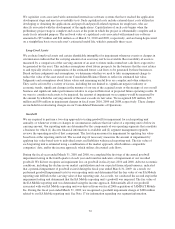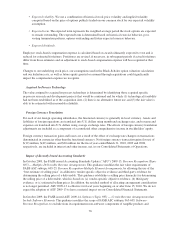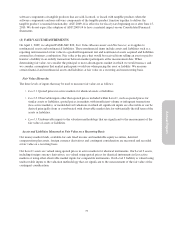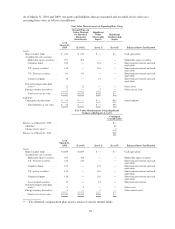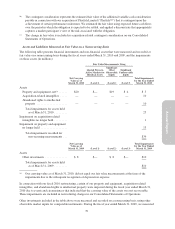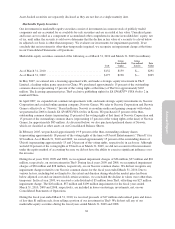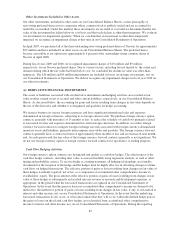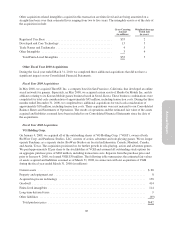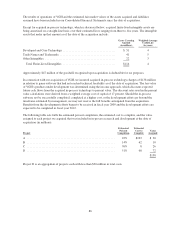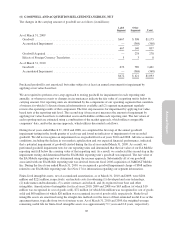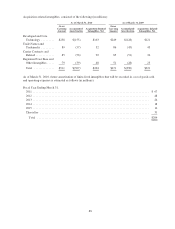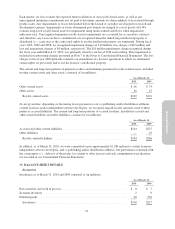Electronic Arts 2010 Annual Report Download - page 160
Download and view the complete annual report
Please find page 160 of the 2010 Electronic Arts annual report below. You can navigate through the pages in the report by either clicking on the pages listed below, or by using the keyword search tool below to find specific information within the annual report.Other Investments Included in Other Assets
Our other investments, included in other assets on our Consolidated Balance Sheets, consist principally of
non-voting preferred shares in two companies whose common stock is publicly traded and are accounted for
under the cost method. Under this method, these investments are recorded at cost until we determine that the fair
value of the investment has fallen below its cost basis and that such decline is other-than-temporary. We evaluate
our investments for impairment quarterly. When we conclude that an investment is other-than-temporarily
impaired, we recognize an impairment charge at that time in our Consolidated Statements of Operations.
In April 2007, we purchased all of the then-outstanding non-voting preferred shares of Neowiz for approximately
$27 million and have included it in other assets on our Consolidated Balance Sheets. The preferred shares
became convertible at our option into approximately 4 percent of the outstanding voting common shares of
Neowiz in April 2008.
During fiscal years 2009 and 2008, we recognized impairment charges of $10 million and $9 million,
respectively, on our Neowiz preferred shares. Due to various factors, including but not limited to, the extent and
duration during which the fair value had been below cost, we concluded the decline in value was other-than-
temporary. The $10 million and $9 million impairments are included in losses on strategic investments, net, on
our Consolidated Statements of Operations. We did not recognize any impairment charges in fiscal year 2010 on
our other investments.
(4) DERIVATIVE FINANCIAL INSTRUMENTS
The assets or liabilities associated with our derivative instruments and hedging activities are recorded at fair
value in other current assets or accrued and other current liabilities, respectively, in our Consolidated Balance
Sheets. As discussed below, the accounting for gains and losses resulting from changes in fair value depends on
the use of the derivative and whether it is designated and qualifies for hedge accounting.
We transact business in various foreign currencies and have significant international sales and expenses
denominated in foreign currencies, subjecting us to foreign currency risk. We purchase foreign currency option
contracts, generally with maturities of 15 months or less, to reduce the volatility of cash flows primarily related
to forecasted revenue and expenses denominated in certain foreign currencies. In addition, we utilize foreign
currency forward contracts to mitigate foreign exchange rate risk associated with foreign-currency-denominated
monetary assets and liabilities, primarily intercompany receivables and payables. The foreign currency forward
contracts generally have a contractual term of approximately three months or less and are transacted near month-
end. At each quarter-end, the fair value of the foreign currency forward contracts generally is not significant. We
do not use foreign currency option or foreign currency forward contracts for speculative or trading purposes.
Cash Flow Hedging Activities
Our foreign currency option contracts are designated and qualify as cash flow hedges. The effectiveness of the
cash flow hedge contracts, including time value, is assessed monthly using regression analysis, as well as other
timing and probability criteria. To receive hedge accounting treatment, all hedging relationships are formally
documented at the inception of the hedge and the hedges must be highly effective in offsetting changes to future
cash flows on hedged transactions. The effective portion of gains or losses resulting from changes in fair value of
these hedges is initially reported, net of tax, as a component of accumulated other comprehensive income in
stockholders’ equity. The gross amount of the effective portion of gains or losses resulting from changes in fair
value of these hedges is subsequently reclassified into net revenue or research and development expenses, as
appropriate, in the period when the forecasted transaction is recognized in our Consolidated Statements of
Operations. In the event that the gains or losses in accumulated other comprehensive income are deemed to be
ineffective, the ineffective portion of gains or losses resulting from changes in fair value, if any, is reclassified to
interest and other income, net, on our Consolidated Statements of Operations. In the event that the underlying
forecasted transactions do not occur, or it becomes remote that they will occur, within the defined hedge period,
the gains or losses on the related cash flow hedges are reclassified from accumulated other comprehensive
income to interest and other income, net, on our Consolidated Statements of Operations. During the reporting
82


